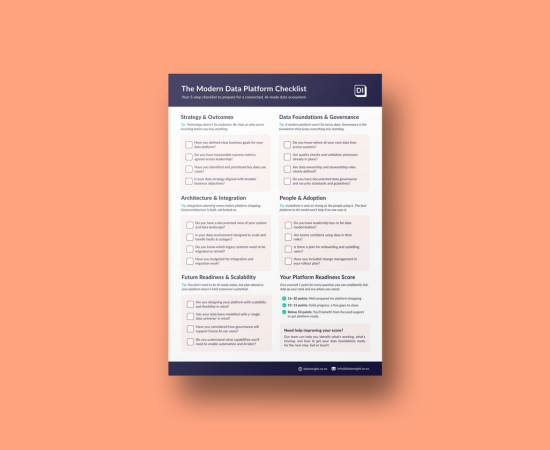Even though data is so critical today, many businesses need help becoming adept at extracting value from their data.
This is what data maturity is all about; it is a measurement of how well an organisation utilises their data. The components that feed into this measurement are things like processes, technology, and, of course, the level of data capability of the people within the business.
Organisations that leverage all or most of their data to inform decisions, advance business goals and gain competitive advantages are what we’d consider as having mature data practices.
That is, data is considered the ‘life blood’ of the organisation and underpins most decisions around strategy and planning, operations, processes, product development, inventory, staffing and accounting. Data mature businesses are better equipped to identify and mitigate any risks and can more accurately forecast and plan, which enables greater optimisation of people, processes, and technology.
4 Top Traits of Data Mature Organisations
- Data is democratised: Data democratisation is about enabling people to utilise and gain value from data irrespective of their data knowledge or skills. Data mature organisations ensure there are no barriers that stop their people from accessing or understanding data, and they provide the tools and training to enable data to be utilised to make evidence-based decisions. Democratisation of data is one of the key steps in the journey to data maturity.
- Culture of data: Establishing a culture of data goes hand-in-hand with data democratisation. Data mature organisations not only enable their people to utilise data, they also activate a culture that is data-driven and places onus on the team to view data as integral. In this type of culture, data isn’t merely a tool, it’s a way of being.
- Focus on data quality: With data, it’s a case of quality in, quality out. In other words, the quality of your decisions comes down to the quality of your data. Mature businesses don’t just collect and use data, they have data quality management systems in place to constantly monitor and clean data and resolve any data issues that may arise. Confidence in data comes from trusting its quality.
- Speed and agility: The digital age means things change much faster than they used to. And so being able to respond to market changes with speed and agility means opportunities are maximised and any potential threats are mitigated with relative ease. Data and analytics are central to being able to make timely changes. Data can be used to forecast and predict future trends, alert to anything that may be amiss, identify customer behaviours and flag any areas of the customer experience that are under performing, or indeed that could be grown, and respond quickly and efficiently.
All these data maturity traits (and more) contribute to a successful organisation that uses data as evidence to ground its decisions to stay ahead of the market and sustain strong year-on-year growth.








.png)